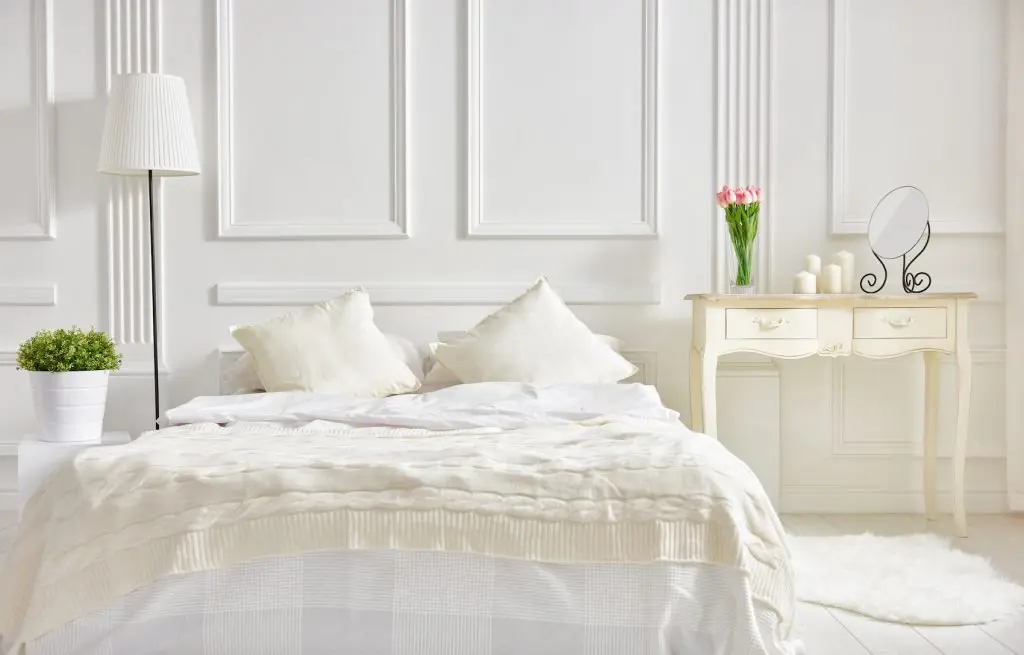We spend 1/3rd of our life sleeping, so our bedroom needs to be ideal for sleeping. Creating your bedroom for the ultimate comfort and best sleep will improve every facet of your life from energy levels, mental capacity and your physical health. So what are ways you can maximize the comfort of your bedroom? Check out our top 4 Dos and Donts.
1. Your Bed: Choosing the Right Mattresses, Pillows, Sheets, Blankets and Duvets
What’s on your bed is the most important thing on our list. If you’re mattress, pillows, sheets, blanket and duvet are right, then the rest will come easy and you’ll be feeling well rested in no time.
Do
A great sleep can often be achieved with the right mattress. If a new mattress is what you really need, finding the right one for you is important. Read our blog to help you decide which mattress is right for you.
The right pillows can also greatly improve your sleep. Similarly to mattresses, pillows that are too soft or firm will make it harder to fall asleep. Take a look at our pillow selection for a variety of sizes and firmness.
Duvets, blankets and sheets are the last thing on your bed that make a big difference. What fabrics do you prefer? What about the weight and number of blankets or duvets?
Don’t
If you’re constantly adjusting your pillows or waking up feeling a stiff neck, then consider this something you don’t want!
Similarly, if you’re throwing blankets on and off all night and waking up too hot, then too cold. With Kelowna’s weather, the temperature is sure to change with the season, so adjust with the seasons and don’t use the same bedding year round!
Sleeping on a mattress that is too soft or firm will negatively impact your sleep quality. There are ways to improve your mattress without completely buying a new one. Check out our mattress pads for affordable alternatives.
2. Adjust Your Bedroom’s Elements
Create a relaxing and inviting environment that you want to sleep in. We all have different definitions of what makes our bedroom a sleep palace. Lighting, temperature, and noise are all subjective, but important aspects to consider.
Do
Dim lamps next your bedside can be a great way to ease into sleep mode. Perhaps you sleep better in the pitch black, or you like to wake up with the sun. Consider the blinds and curtains you have your windows, and adjust them to suit your preferences.
Perhaps you like to sleep in a cold room under a nice thick duvet, or you prefer a warm room with no blankets, or somewhere in between. We’ve all had those nights where we can’t sleep because it’s either too hot or too cold. Adjusting the temperature in your room is an incredible way to help ease you to sleep.
Lastly, noise can make a huge impact. How noise benefits or hinders our sleep varies from person to person. A sound machine, quiet serene music or even a fan might be what you need to reach that REM sleep. On the other hand, total silence might be the key.
Don’t
Forcing yourself to go sleep in an environment that isn’t ideal for sleeping, whether it’s due to street lights, noise or temperature isn’t going to fix itself or help you relax!
Bright lights, even busy and distracting colours or decor in your bedroom can be a huge hinderance to your sleep. Consider your decor, colour schemes and lighting.
3. Bedtime and Morning Routines
What we do before bed and when we get out of bed can either help us unwind and prepare for the day, or hinder us.
Do
There are several things you can try, and some will be more effective for you than others. Find what works for you, from meditating to reading a book to listening to music. Read these 10 Bedtime Routine Suggestions for ideas.
Implementing routines that work for you paired with going to bed and waking up at the same time will make going to sleep and waking up much easier over time.
Don’t
The most important thing is consistency. Don’t vary your sleep and wake times or the number of hours your sleep. Even on weekends you should try to wake up and go to bed around the same time. It’s important you get enough sleep every night. Don’t sleep a few hours during the week and then spend all weekend catching up on sleep.
4. Minimize Furniture & Activities in your Bedroom
Is your room cluttered or difficult to get around? That could be incredibly distracting, and stressful if you’re tripping over your furniture and other items.
Do
Keep the things in your room to a minimum. The less stuff you have, the easier it is to create a relaxing bedroom. Hidden storage units such as wardrobes and dressers, or closets can help you keep all your possessions within in reach, without having it clutter your space visually.
Another way to keep things to a minimum is to only use your room for sleeping, and low key activities that help you unwind from the day. Reading in bed before sleep is a great way to relax.
Don’t
Avoid doing work, eating, using your laptop, or watching TV in your bedrooom. Take a look at this blog, Why Electronics Don’t Belong in Your Bedroom for more details.

